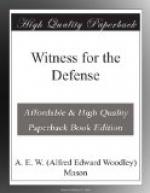And deep in Thresk’s mind was the terror of the mistakes people make in ignorance of each other, and of the mortal hurt the mistakes inflict. He had misread Stella. Here was she misreading him and misreading him in some strange way to her peril and ruin.
“You are sure of that?” he asked. She had no doubt—no more doubt than he had had of the reason why she stood preparing her rifle.
“Quite,” she answered. “You had heard of me in Bombay and it came over you that you would like to see how the woman you had loved looked after all these years: whether she retained her pretty way, whether she missed you—ah, above all, whether she missed you. You wanted to fan up into a mild harmless flame the ashes of an old romance, warm your hands at it for half an hour, recapture a savour of dim and pleasant memories and then go back to your own place and your own work, untouched and unhurt.”
Thresk laughed aloud with bitterness at the mistake she had made. Yet he could not blame her. There was a certain shrewd insight which though it had led her astray in this case might well have been true in any other case, might well have been true of him. He remembered her disbelief in all that he had said to her in that tent at Chitipur; and he was appalled by the irony of things and the blind and feeble helplessness of men to combat it.
“So that’s why I came to Chitipur?” he cried.
“Yes,” Stella answered without a second of hesitation. “But I couldn’t be left untouched and unhurt. You came and all that I had lost came with you, came in a vivid rush of bright intolerable memories.” She clasped her hands over her eyes and Thresk lived over again that evening in the tent upon the desert, but with a new understanding. His mind was illumined. He saw the world as a prison in which each living being is shut off from his neighbour by the impenetrable wall of an inability to understand.
“Memories of summers here,” she resumed, “of women friends, of dainty and comfortable things, and days of great happiness when it was good—oh so very good!—to be alive and young. And you were going back to it all, straight by the night-mail to Bombay, straight from the station on board your ship. Oh, how it hurt to hear you speak of it, with a casual pleasant word about exile and next-door neighbours!” She clasped her hands together in front of her, her fingers worked and twisted. “No, I couldn’t endure it,” she whispered. “The blows, the ridicule, the contempt, I determined, should come to an end that night, and when you saw me with the rifle in my hand I was going to end it.”
“Yes?”
“And then the stupidest thing happened. I couldn’t find the little box of cartridges.”
Stella described to him how she had run hither and thither about the tent, opening drawers, looking into bags and growing more nervous and more flurried with every second that passed. She had so little time. Ballantyne was not going as far as the station with Thresk. He merely intended to see his visitor off beyond the edge of the camp. And it must all be over and done with before he came back. She heard Ballantyne call to Thresk to sit firm while the camel rose; and still she had not found them. She heard Thresk’s voice saying good-night.




